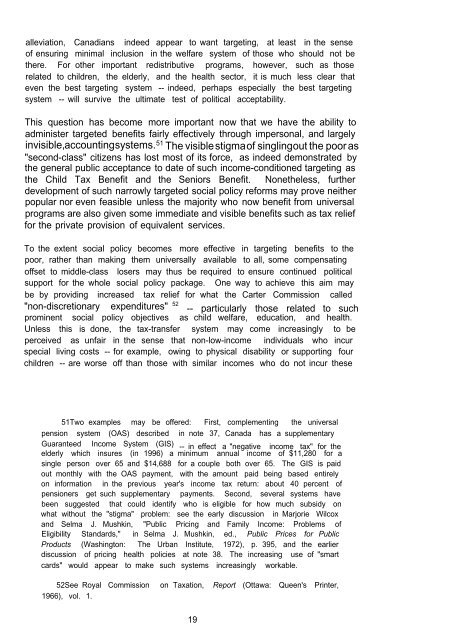Richard Bird - Institute for Public Economics - University of Alberta
Richard Bird - Institute for Public Economics - University of Alberta
Richard Bird - Institute for Public Economics - University of Alberta
Create successful ePaper yourself
Turn your PDF publications into a flip-book with our unique Google optimized e-Paper software.
alleviation, Canadians indeed appear to want targeting, at least in the sense<strong>of</strong> ensuring minimal inclusion in the welfare system <strong>of</strong> those who should not bethere. For other important redistributive programs, however, such as thoserelated to children, the elderly, and the health sector, it is much less clear thateven the best targeting system -- indeed, perhaps especially the best targetingsystem -- will survive the ultimate test <strong>of</strong> political acceptability.This question has become more important now that we have the ability toadminister targeted benefits fairly effectively through impersonal, and largelyinvisible,accountingsystems. 51 The visiblestigma<strong>of</strong> singlingout the poor as"second-class" citizens has lost most <strong>of</strong> its <strong>for</strong>ce, as indeed demonstrated bythe general public acceptance to date <strong>of</strong> such income-conditioned targeting asthe Child Tax Benefit and the Seniors Benefit. Nonetheless, furtherdevelopment <strong>of</strong> such narrowly targeted social policy re<strong>for</strong>ms may prove neitherpopular nor even feasible unless the majority who now benefit from universalprograms are also given some immediate and visible benefits such as tax relief<strong>for</strong> the private provision <strong>of</strong> equivalent services.To the extent social policy becomes more effective in targeting benefits to thepoor, rather than making them universally available to all, some compensating<strong>of</strong>fset to middle-class losers may thus be required to ensure continued politicalsupport <strong>for</strong> the whole social policy package. One way to achieve this aim maybe by providing increased tax relief <strong>for</strong> what the Carter Commission called"non-discretionary expenditures" 52 -- particularly those related to suchprominent social policy objectives as child welfare, education, and health.Unless this is done, the tax-transfer system may come increasingly to beperceived as unfair in the sense that non-low-income individuals who incurspecial living costs -- <strong>for</strong> example, owing to physical disability or supporting fourchildren -- are worse <strong>of</strong>f than those with similar incomes who do not incur these51Two examples may be <strong>of</strong>fered: First, complementing the universalpension system (OAS) described in note 37, Canada has a supplementaryGuaranteed Income System (GIS) -- in effect a "negative income tax" <strong>for</strong> theelderly which insures (in 1996) a minimum annual income <strong>of</strong> $11,280 <strong>for</strong> asingle person over 65 and $14,688 <strong>for</strong> a couple both over 65. The GIS is paidout monthly with the OAS payment, with the amount paid being based entirelyon in<strong>for</strong>mation in the previous year's income tax return: about 40 percent <strong>of</strong>pensioners get such supplementary payments. Second, several systems havebeen suggested that could identify who is eligible <strong>for</strong> how much subsidy onwhat without the "stigma" problem: see the early discussion in Marjorie Wilcoxand Selma J. Mushkin, "<strong>Public</strong> Pricing and Family Income: Problems <strong>of</strong>Eligibility Standards," in Selma J. Mushkin, ed., <strong>Public</strong> Prices <strong>for</strong> <strong>Public</strong>Products (Washington: The Urban <strong>Institute</strong>, 1972), p. 395, and the earlierdiscussion <strong>of</strong> pricing health policies at note 38. The increasing use <strong>of</strong> "smartcards" would appear to make such systems increasingly workable.52See Royal Commission on Taxation, Report (Ottawa: Queen's Printer,1966), vol. 1.19



